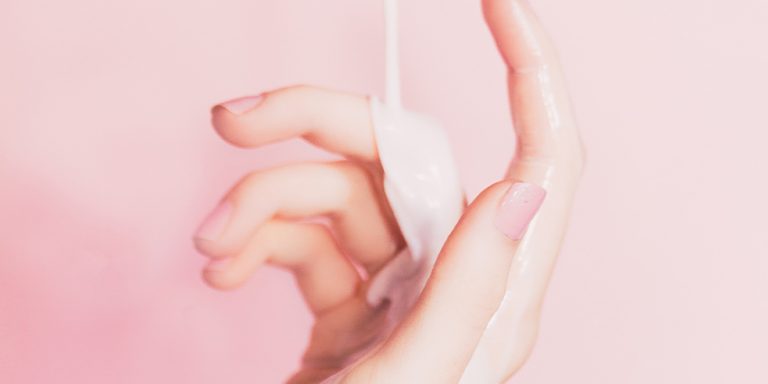In the words of the great Cardi B “Now get a bucket and a mop, that’s some wet ass pussy”. Vaginas get wet. It’s one of the many wonderful things they do. If you have a vagina, I hope you embrace its wetness.
If you don’t, we understand. People with vaginas have been told to be ashamed of their bodies, to hide them, or that they’re gross. Yet at the same time, they’re also sexualized and commodified. What a conundrum!
There’s a lot of shame around vaginal wetness, even though it’s a basic biological function. Why do vaginas get wet in the first place, where did this societal shame come from, and how do you embrace your WAP? I hope you brought your bucket and a mop because we’re about to find out!
Why and How Do Vaginas Get “Wet”?
We’re going to teach you something you probably didn’t learn in biology class. What exactly is vaginal wetness, or lubrication?
Vaginal lubrication is a part of physiological sexual arousal in people with vaginas. Lubrication starts from the cervix and secretions from the Bartholin glands. When you’re getting turned on, or experiencing arousal, there is increased blood flow to the pelvic area. This causes an average of 3-5 ml of fluid to leak across vaginal mucosal cells. Vaginal fluid is very similar to blood minus red blood cells and other structures that are filtered out.
Of course, arousal is complicated and more nuanced than a physiological function. That’s why you can get wet without being aroused, and you can be aroused without getting wet. We’ll tell you here and now – unless you have discharge with a strong odor, itch, or pain, there’s no such thing as too much lubrication during arousal.
The History of Shaming Vaginal Wetness
You’ve probably heard of the ancient Greek physician Hippocrates, who many consider the father of medicine. While he may have contributed a lot to the evolution of medicine, he also had some weird views on vaginas.
He compared the gynecological structures to riverbeds, which is pretty cool, albeit anatomically incorrect, essentially saying the female body is a microcosm of the earth, with all its water channels.
When talking about arousal, he said that women ejaculate from their bodies (true). They also sometimes ejaculate into their uterus, causing the uterus to become moist. Nope, that’s not how it works buddy.
He also said the female body is spongy, loose, and capable of absorbing lots of fluid, which can cause an over-wetness. This fed into the idea that women are physically inferior to men because they’re more “wet”. It was believed that the purpose of menstruation was to drain the excess fluid from the body to prevent a dangerous build-up. What?!
Medical practitioners created different therapies to help “relieve women of their wetness”, likely causing long-term damage. Things have gotten better for people with vaginas, but this shame has persisted.
WAP Shaming Today
It didn’t end with Hippocrates, we see shame around vaginal wetness all over. In the media, on the shelves of stores, and in our relationships.
People still think that their vagina is too wet, that it smells, or that it’s dirty. Flipping through a magazine, social media, or TV can add more fuel to the flame. Content on keeping your underwear clean is just one of the many examples of why people are ashamed of normal vaginal discharge and wetness.
The feminine hygiene industry has perpetuated shame around vaginal wetness by selling products like douches and cleansing wipes. The vagina has its own incredible microbiome, which is self-cleaning. These feminine hygiene products are completely unnecessary and can lead to vaginal imbalances and infections, and can ironically – impact your sex life.
Your current relationship or relationship history can lead to insecurities about vaginal wetness. If a partner has ever commented or complained about your wetness, whether it was on your body or the bed, you can carry that with you, creating shame.
What if I Don’t Have a Wap?
As ashamed as people have been made to be about their WAPs, there’s also shame around having a DAP, aka vaginal dryness. People with vaginas sometimes just can’t win (in the eyes of society).
Just like vaginas being wet are normal, it’s also common for people to experience vaginal dryness. Vaginal dryness is most commonly caused by changing hormone levels during menopause, but can also be caused by lower estrogen levels after pregnancy, or from certain medications or medical conditions.
If you want to address your vaginal dryness, you may want to consider hormonal medication, changing medications that may be affecting your vagina, or addressing underlying health issues. Another great tool is lube! Using a personal lubricant can help you enjoy your sex life, no matter your level of WAP-ness.
Even if you do tend to get wet more often than not, you still might experience vaginal dryness after you’ve been having sex for a bit, or it may take some time for you to get wet. No matter how wet your vagina is, anyone can benefit from using a personal lubricant.
Embracing Your Vagina
With centuries of weird ideas about the female body trickling down into our current views, it can be hard to accept your body, let alone embrace it. Learning to love your vagina and its wetness (or lack thereof) can come down to two things:
- Understanding it’s just a body part and anything it does or doesn’t do is merely a function of biology.
- It’s an incredible part of the body that has its own microbiome, can carry and birth life if you choose to do so, and is capable of creating immense amounts of pleasure.
Vaginal wetness is nothing to be ashamed of. You’re not dirty or unhygienic or “less than”. You’re a normal human with a body part doing what it was designed to do. Let’s normalize all things body related. We’re all on this planet together, WAP or no wap.

